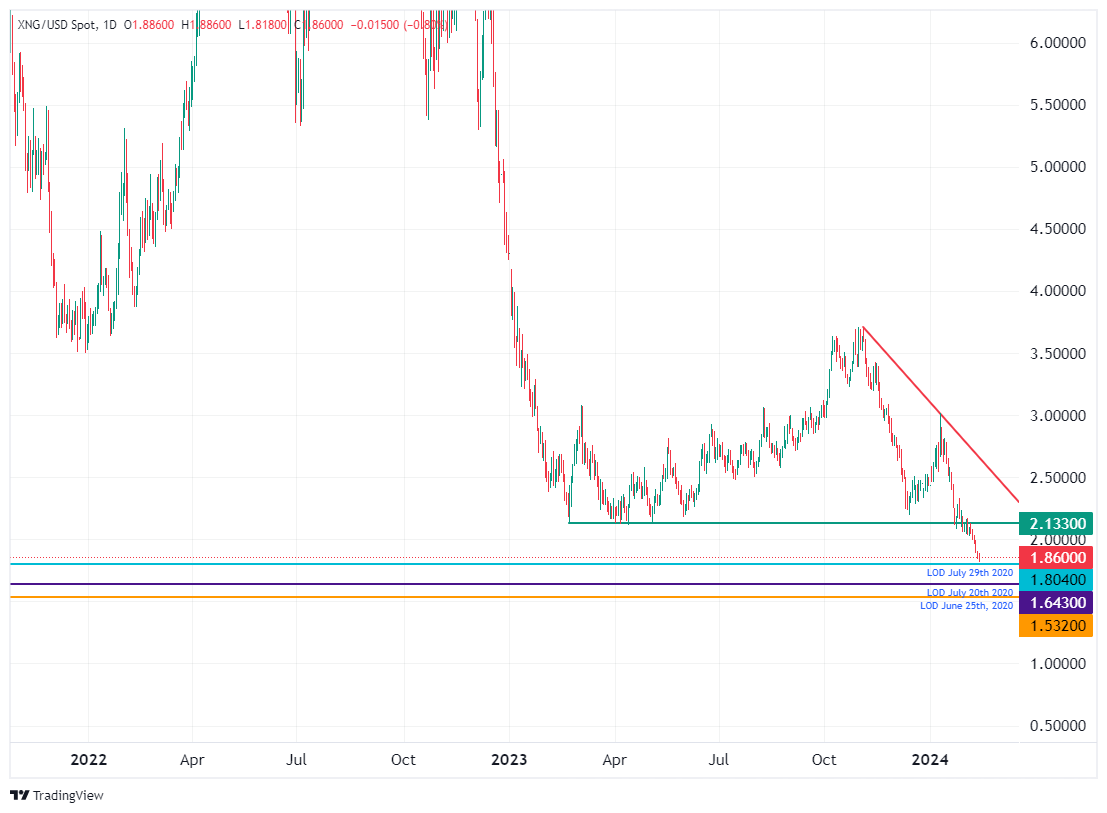- Analytics
- News and Tools
- Market News
- Natural Gas drops over 1% in Monday trading on spring temperatures
Natural Gas drops over 1% in Monday trading on spring temperatures
- Natural Gas slides over 1% in early Monday trading.
- Traders are sending Gas prices lower with temperatures hitting higher-than-normal levels in Europe.
- The US Dollar Index is steady ahead of US CPI numbers on Tuesday.
Natural Gas (XNG/USD) is eking out more losses at the start of this week with the weather man as the biggest catalyst for this steep decline on this occasion. A warm front is set to kick in in Europe. Temperatures are forecast to top 17 degrees Celcius in Paris for example, which is exceptional for this time of year. For 2024, this puts the Gas reserves in Europe at a very good position ahead of the next heating season with less need to acquire supply during the coming six months.
The US Dollar (USD) is facing some pressure from all angles. Geopolitical tensions are present, favouring the Greenback on the one hand. While on the other hand traders are looking forward to the US Consumer Price Index (CPI) on Tuesday with US inflation expected to continue its disinflationary pathway lower, which advocates for a bit weaker US Dollar.
Natural Gas is trading at $1.85 per MMBtu at the time of writing.
Natural Gas market movers: All about the weather
- Extreme warm and mild temperatures are preserving current Gas storage levels in Europe. This puts Europe in a good position to restock for next winter.
- MidOcean Energy acquires 20% of stake in Peru LNG in search of supply towards growth market India.
- Gas futures are seeing the more forward contracts (over summer) showing bearish signs as well, with buyers not buying up as much on average ahead of Winter 2024.
- Focus remains on Capitol Hill where lawmakers are still unhappy with the Biden ban on LNG exports, with possible legal claims being put forward to get the ban dismissed.
Natural Gas Technical Analysis: Natgas hits pre-Ukraine levels
Natural Gas is facing a more substantial downturn. Traders fear Biden’s current Gas-exporting moratorium could be lifted, leading to an influx of Natural Gas supply flooding markets. Set against demand which is expected to remain low, such an influx would tip the price lower.
On the upside, Natural Gas is facing some pivotal technical levels to get back to. First, $1.99 which saw an accelerated decline. Next is the blue line at $2.13 with the triple bottoms from 2023. In case Natural Gas sees sudden demand pick up, possibly $2.40 could come into play.
Keep an eye on $1.80, which was a pivotal level back in July 2020. Should Biden’s moratorium be lifted, together with the additional supply from Canada which is exporting more to fill the gap from the US, $1.64 and $1.53 (low of 2020) are targets to look out for too.

XNG/USD (Daily Chart)
Natural Gas FAQs
What fundamental factors drive the price of Natural Gas?
Supply and demand dynamics are a key factor influencing Natural Gas prices, and are themselves influenced by global economic growth, industrial activity, population growth, production levels, and inventories. The weather impacts Natural Gas prices because more Gas is used during cold winters and hot summers for heating and cooling. Competition from other energy sources impacts prices as consumers may switch to cheaper sources. Geopolitical events are factors as exemplified by the war in Ukraine. Government policies relating to extraction, transportation, and environmental issues also impact prices.
What are the main macroeconomic releases that impact on Natural Gas Prices?
The main economic release influencing Natural Gas prices is the weekly inventory bulletin from the Energy Information Administration (EIA), a US government agency that produces US gas market data. The EIA Gas bulletin usually comes out on Thursday at 14:30 GMT, a day after the EIA publishes its weekly Oil bulletin. Economic data from large consumers of Natural Gas can impact supply and demand, the largest of which include China, Germany and Japan. Natural Gas is primarily priced and traded in US Dollars, thus economic releases impacting the US Dollar are also factors.
How does the US Dollar influence Natural Gas prices?
The US Dollar is the world’s reserve currency and most commodities, including Natural Gas are priced and traded on international markets in US Dollars. As such, the value of the US Dollar is a factor in the price of Natural Gas, because if the Dollar strengthens it means less Dollars are required to buy the same volume of Gas (the price falls), and vice versa if USD strengthens.
© 2000-2026. All rights reserved.
This site is managed by Teletrade D.J. LLC 2351 LLC 2022 (Euro House, Richmond Hill Road, Kingstown, VC0100, St. Vincent and the Grenadines).
The information on this website is for informational purposes only and does not constitute any investment advice.
The company does not serve or provide services to customers who are residents of the US, Canada, Iran, The Democratic People's Republic of Korea, Yemen and FATF blacklisted countries.
Making transactions on financial markets with marginal financial instruments opens up wide possibilities and allows investors who are willing to take risks to earn high profits, carrying a potentially high risk of losses at the same time. Therefore you should responsibly approach the issue of choosing the appropriate investment strategy, taking the available resources into account, before starting trading.
Use of the information: full or partial use of materials from this website must always be referenced to TeleTrade as the source of information. Use of the materials on the Internet must be accompanied by a hyperlink to teletrade.org. Automatic import of materials and information from this website is prohibited.
Please contact our PR department if you have any questions or need assistance at pr@teletrade.global.















